
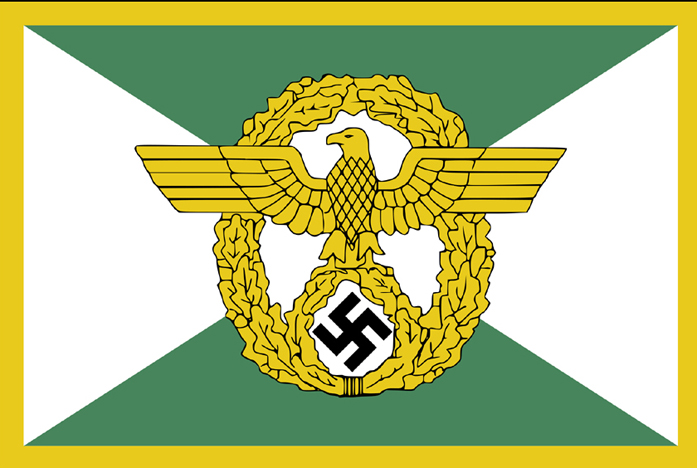

Interview with Josef H. from the Order Police [The Ordnungspolizei, or 'Order Police', were the police force in Germany from 1936-1945] assigned to Warsaw during the 1944 uprising.
He was a veteran of the Wehrmacht and fought in Poland and France, where he was wounded. Trier, Germany, 1990.
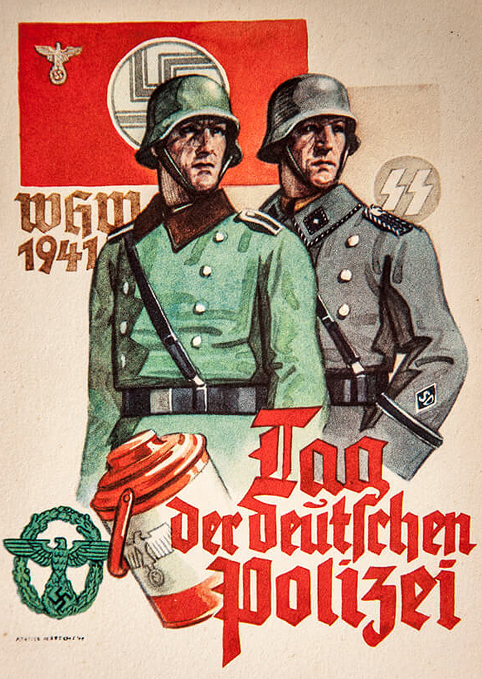
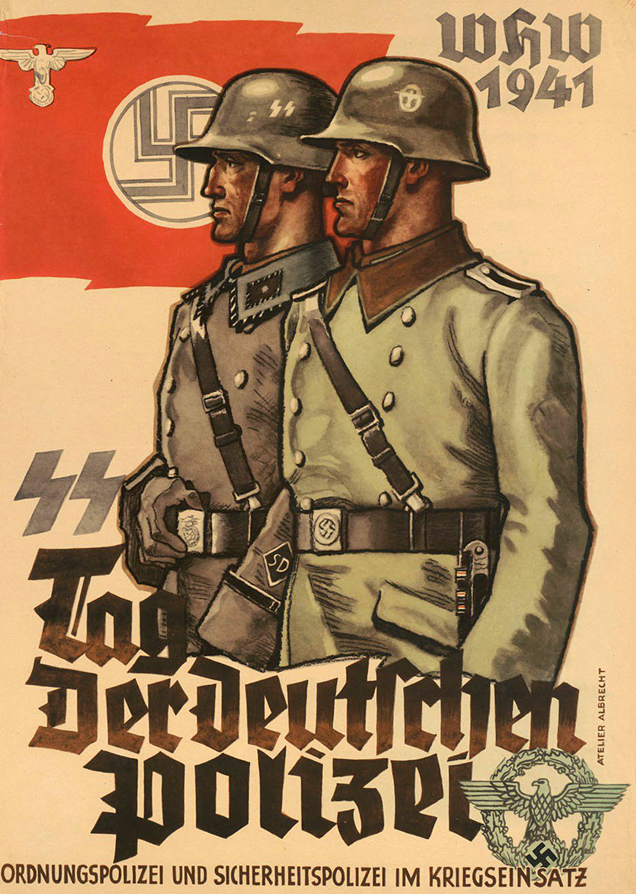
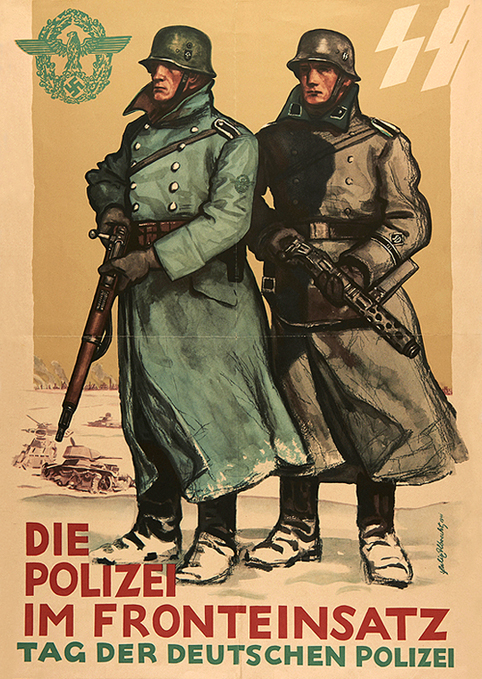
[Above: This 1941 poster (left) promotes the 'Tag of deutschen polizei' (Day of German Police). Like the middle poster it is sponsored by the 'WHW', an abbreviation for the 'The Winterhilfswerk des Deutschen Volkes' (The Winter Relief Fund of the German People). The middle poster honors the 'Ordnungspolizei (Order Police) und Sicherheitpolizei (Security Police)' and 'im Kreigseinsatz' (war effort). The poster on the right also celebrates the Day of German Police. Note that all three posters show an Order Police and an SD man.]
Thanks for letting me speak with you, as I mentioned I am taking down notes for a history project for the future. I would like to start by asking how you came to be part of the police.
Josef: Very good young one, I would like to answer you but you must help me by keeping this to yourself. We do not have the luxury to be open about our time in the war. Do you understand? I started out life in Berlin, Kreuzberg district, to be exact. My father was a factory worker and my mother worked in a bakery.
Growing up in the 20s was very confusing as the Marxists and Nazis fought each other. I still remember seeing the reds in our area hold parades and rallies. They insisted that everyone join or support them; if you did not you were nothing to them. I remember my mother was for them, but my father was not.
They would often argue over dinner about which side would do more for the common people. Something I will say that swayed me to side with my father was I would see them bully anyone who disagreed with their ideas. I was strong and big for my age, so I often would become involved in disputes. I could not let them bully the weaker kids over who was for them and who was not.
This left a very bad feeling with me. My mother became very sick in 1932 and she couldn't give money to the reds any longer. I remember my father saying it was good they could not extort money from her any longer. She ended up dying of cancer and not one red came to give their greeting. My father had started leaning towards the SA, and they sent a person over with flowers and a letter for me.
The letter is long lost, but the commander of the SA unit wrote me to be strong and fearless. I would feel like a ship without a sail, adrift in the ocean. However the teaching of my mother would always be with me and would give me strength to carry on. She would beckon me to be brave and bring honor to our blood. That really got to me, and I knew then that these were moral people of the highest honor.
The reds would often harass my dad, as he had many friends in the SA; he was fired from his job in 1932 for being a supporter of the Nazis. His boss and many workers were Red Front members. He then was accepted into the Berlin SA, and the party helped us with food and rent. In 1933 our lives got better. Hitler came to power and my father was given a new factory job.
He was then recruited to be in the RAD [Reichsarbeitsdienst, or Reich Labor Service] as a supervisor overseeing building projects. This paid him much more money than before and our conditions improved. I knew I would be done with school in 1938, so I chose to join the army, which I did. I started out in the 24th Artillery Regiment. I was very eager to do my duty for the new Germany, as most all of us were.
I was wounded early in the war, and sent to heal, but the wound made it so I could not be in the field any longer. I was given the chance to join the Order Police, which I did and after further training I was sent to Poland.
I understand that you were part of the war with Poland in 1939; can I ask what it was like for you, or what you remember?
Josef: It was our first time fighting so we were all pretty scared, I can tell you. The crisis with Poland came as a bit of a shock that summer, the papers told of negotiations with Poland to give Germany the land or at least a freeway into Prussia. That's all it was really, they had land that was taken from Germany. Hitler wanted to set things right, and get some of the land back.
The Pollacks refused what most all of us thought to be reasonable offers and requests, to simply let us have back what was ours, and not all of it, only some. They were bolstered by England who wanted to be the bully of Europe. Hitler saw there was to be no peaceful settlement, and because of attacks on our citizens and borders, we mobilized.
We moved to the south and entered Poland where they gave us a greeting right away. We faced strong units who were equipped for an offensive into Silesia. We had to break their lines which was very hard at times. They were a well supplied army who showed bravery, often times they even outnumbered us.
I saw our Panzers used for the first time, and they gave a good account of themselves. We had to repel Polish tanks that had better guns than the small Panzers, I remember. Our cannons fired shell after shell until we ran out and had to wait for resupply, but we stopped their attack. We had other regiments who came to us for relief and we were able to push the Poles aside.
They put up quite a fight the whole way, this was no easy victory. I saw them shoot down a bomber close to our lines, and we saw the crew in white parachutes, but never saw them again when we took the area later on.
We learned later they were shot by Poles which was a war crime. We had very bad fights with the Poles who often would run and hide, then attack us in the back.
These were some of the reasons we had a dislike of the Pollacks, they fought well sometimes, and other times were sneaky and cowardly. We respected the soldiers who fought with honor, but for the sneaky ones we had contempt. I will say to you that in spite of that we treated them all fair. We stayed in Poland until being moved to the west to deal with France.
How was the French campaign, what do you remember?
Josef: France did not last long for me, which might have saved me, who knows? We entered into Belgium and moved very quickly as the resistance was not strong. When we came into France, we were held up by a town, and they attacked us with heavy tanks. I was in position and shells started falling on us and I was hit in the stomach.
My comrades laughed, that for me the war was done, and would have to enjoy the victory from a bed. I was moved out of the line and sent on a train back to the Reich. My wound was severe and turned septic so I was in the hospital until October 1940. I then was told no more playing war for me; I was to be on desk duty for light work.
I also was handed a recruiting paper for the police and told I could be allowed to join them, as it would permit a healthy person to take my place. My father had remarried a woman while I was away fighting, and it seemed like I was no longer needed at home. So I agreed to join the police, applied, and was sent to training. After all this I was sent back to Poland and put on the staff of the Order Police for Warsaw.
What was Warsaw like for you? How was interaction with the people?
Josef: The interactions with the people were good, but the city was large and had trouble areas. That first year I was there I saw where Polish soldiers came home, and prisoners had been released. They had to come to us to register so we could keep track of who was who.
The city was being repaired all over; we had shelled the city as it was made a fortress by the Polish army. German and Polish firms worked together, and the Red Cross had offices open to help the people. I had to watch over ladies from the labor force who came to help the Poles.
There was fear some Poles may target or harass them. They had us assigned to their street to watch over the building, that was my first assignment. We had daily assignments to our beat, and would go out and either patrol or guard somewhere.
In my area a building was condemned and we had to watch that no one was hurt by falling bricks. It was quite a crowd to contain when they pulled the building down. There was a new kind of machine that helped do it, the kids wanted to play on it. The city was very pleasant to be in for the first few years.
Life went on as in peacetime; we could go out to music clubs, bars, movies, theaters, and other sorts of fun. They had food fairs, and markets all over the city where one could get all sorts of good food. You would see the Poles mixing freely with the German units assigned to the city. Sure there was the occasional fight or complaint, but for the most part it was very friendly.
Many Germans would come to us to complain they were ripped off or taken advantage of by the street vendors, we had to investigate those issues as well. Nothing stands out to me, it was usually someone trying swindle a tourist. Often when we showed up the issues were worked out.
As I said there were no issues in Poland that I ever saw that would look bad on us. Today some say we lorded over them and did terrible things. If they are telling the truth, I never saw any of this. As I said, there were problem areas in the city, where a heavy police presence was, but no abuse.
I wouldn't say the Poles loved us like brothers, but also there was not the hate that they tell us in the papers. Did we arrest and round up wanted criminals? Of course, and at times citizens might have been inconvenienced by searches or questioning, but that was rare and only due to the war.
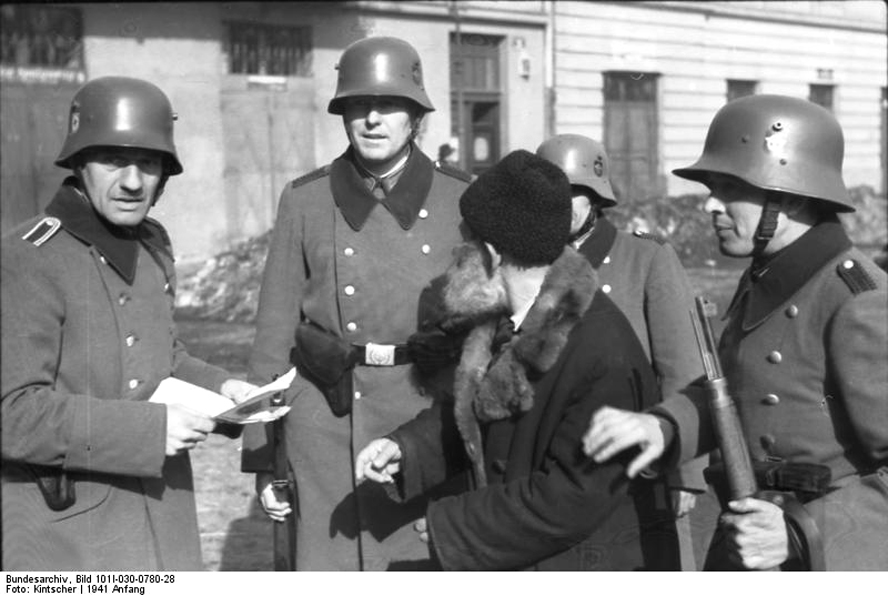
[Above: German police question a man in Krakau. Courtesy of the Bundesarchiv.]
I understand you were in Warsaw during the uprising, can I ask how that was? What did you see?
Josef: Yes I was, but there were a couple of uprisings before this. Warsaw has a large Jewish quarter and to protect the Jews from the Poles, and to watch them better, many were made to move here. Some of them used this base to carry out sabotage and spying for the enemy. Because of this, those caught, and their families, were moved to the east into camps.
When this started, some launched attacks on the people helping move them, which were mainly other Jews. This resulted in more units coming in, and removing a large part of the population to the east. There were strikes and other communist led actions, but the leaders were arrested and this usually broke their will.
The uprising you speak of happened in August of '44, I was there indeed, but I wish I was not. It was a stain on world history where for the first time civilians became part of the fighting – by their choice. There was an underground presence that we knew about, mostly former Polish soldiers whom we had previously released.
The Allies helped arm them to fight a war of sabotage and spying against us. They would cut down poles, distribute leaflets and damage equipment. We caught some of them, I remember that, and they turned on each other. We had a pretty good network of Poles who helped us keep an eye on this group. The SD [The Sicherheitsdienst was the intelligence service of the SS] was the office that handled this group for the most part.
I personally saw no clues anything was going to happen, however the rumors were that the front was coming closer and the Poles were being encouraged to revolt. The people that worked for us were telling of instances of air drops of explosives and all sorts of military equipment from the Allies.
My unit raided a house in our district and we found fake money, guns, passes, and bomb-making supplies. The SD came in and used this to build cases against several people in the building. They started talking, telling of something big in the works for August, so the SD send out alerts to all German and allied units in the city.
For me the attacks started at a German hospital, these terrorists preyed on the weak and defenseless first. They shot down nurses who were on a smoke break, and killed wounded who were out getting sun. Reports started trickling in of lone Germans being assaulted, and I heard gunfire.
Our phone lines went crazy with calls letting us know people with guns were out in the streets. Military units were radioing they were taking fire from civilians, and we had wounded being brought to us by Polish citizens. My commander called in all officers and auxiliaries. I remember a sense of disbelief that this was happening.
I went out with a unit of officers, and we received an MP40 [Maschinenpistole 40, a German submachine gun] which we thought was odd. I had a service pistol which was a Walther. We could hear random gunshots, and as we moved I saw my first fallen German. He was a young boy from the RAD who was repairing bomb damage from an air raid.
I remember seeing an army car that had been set on fire, and as the fire brigade came they were fired on. At first there was very little in the form of military units in the city, you would see soldiers on leave or convalescing. These were the ones who they attacked, and I want to tell these so-called "Home Army" people did not take any prisoners. They killed any German they saw.
This was becoming clear in the first few days of the fighting; this was going to be bad. We came upon a civilian wearing a red and white armband and she was arrested, she told the interpreter she was wearing this to give her status as a combatant. So it was ordered that anyone wearing this would be treated as an armed combatant, but anyone not with it was a terrorist.
The enemy started taking control of several parts of the city and more reports came in of our soldiers being found mutilated and horribly attacked. One I remember had pitchfork wounds from head to toe, where he was tortured and then stabbed to death with it. There was a young nurse I remember who came to our barracks, having escaped from a mob who beat and stabbed her.
I also saw enemy planes fly overhead and attack our positions, and drop supplies to the enemy. I did not see our Luftwaffe at all, they were trying to regroup due to the Soviet offensive, which we found out was halted right before Warsaw. We could hear booming to the east, which encouraged the Poles. We had to shelter in our barracks, and one resourceful comrade got some weapons from somewhere.
We had a machine gun and grenades, which I was used to using. My district was quiet and we had many civilians who came to us for help; this army of liberation was killing its own. Anyone whom they deemed friendly to us was killed. We arranged to have several hundred civilians get out of the city, I was part of this.
We marched with them out of the city, and I saw German units who were getting ready to come in to help. I was able to get a better picture of what had happened. The Home Army launched several attacks at key places and seized much equipment. They had tanks, heavy weapons, grenades, and flak. They at first were up against sick soldiers and those on leave. They seized the equipment off trains and killed the crews and guards, just like common gangsters.
The SS started sending in foreign units to fight them, and this was all that was available, I understand they were without mercy for the Poles. They were from Russia and Ukraine and had no love for Poles, especially since it was non-combatants acting like a combatant, which was a crime.
I also saw some of our own Panzer and flak forces being made ready, and we were sent back with a truck load of weapons, food, and medicine. I noticed a steady stream of civilians fleeing the city, almost all of them did not agree with the Home Army fighters. Believe it or not some of them cheered us as we went back into the city. One had a sign in broken German "protect us from reds like our fathers did" if I remember.
So we knew not all of the people were against us, in fact many came to help us. There was civil war between Poles so to speak, some fought the Home Army. On top of that the Soviets snuck in agitators to force the Home Army to be allies to the Soviets. They ended up fighting us and the Home Army.
I saw one who was caught wearing civilian clothes over his Soviet uniform, he was being sent to the SD office. Those red army supporters took a few hostages, demanding we give them a prisoner exchange for this person. He must have been important to them; they gave back several Germans they had grabbed. They were a mix of soldiers and women auxiliaries.
This Home Army seized neighborhoods and then fortified them like fortresses. We had to bring in artillery and Panzers to clear them. They had many civilians who refused to leave, sided with the Home Army, or were not allowed out. When I see the stories today of all the civilian deaths, I think of that.
My district came under attack later in the month; they hit us with Panzerfausts, and grenades. We repulsed their attacks, thanks to an army pioneer unit who arrived. The block around us was damaged, with some inhabitants wounded, which we had to help to get to a field hospital. The hospitals were marked with Red Cross markings but were not safe, army units had to set up outside the city.
One comrade had his arm shattered when a sniper hit him with an exploding round [Russia commonly used explosive bullets, which were against the Geneva Convention, but Russia had never signed it in the first place]. They were attacking hospitals where wounded Germans were, so all military was moved out. We would hear more intense fighting, and big booms as heavy guns fired on the enemy positions. We sought out soldiers we saw to ask how it was going; we were slowly gaining strength and taking back the city.
We started having to go out on patrols, alongside newly arrived army units, since we knew the district. We were fired on from a building and the time of mercy was done, a flamethrower was used to flush out the enemy. Like rats they ran out firing at us and were shot down and survivors taken prisoner. We now had to take everyone prisoner, even without an armband.
The battle to retake the city was in full swing, the guns by the river were hitting any building where shooting had come from. The Poles were using any building they could, the royal castle, museums, churches, and schools. Any building that housed these criminals was shelled and attacked. If they are being truthful that innocent civilians were being killed, then they caused this by shooting at us in their midst.
I know there were orders to be aware of civilians, and sacred buildings which were not to be touched, but the nature of this battle made that hard to stick to. When your enemy takes over a building and then uses its protection to fire on you, you have to stop that threat.
I saw after the fighting the groups who were clearing buildings and most all bodies I saw were Home Army members wearing those arm bands. I saw very little in the way of women and children that were victims of the fighting. To hear them today, they say we acted coldly to schools, hospitals, and libraries killing praying parents and children asking for mercy.
I do not believe they are being honest, and have let the hate of war take hold of them, with the help of Soviet propaganda. The stories they speak of, kindergarten kids being run over by Panzers on purpose, mothers raped in front of children and so forth. These are stories used to justify the expulsion of Germans, causing many deaths after the war.

[Above: Martyr Jürgen Stroop (4th from right) was the German SS and Police Leader in Poland during the Warsaw Uprising. He was murdered, like so many others, after the war on fake charges. The truth is they hated Stroop for putting down their little uprising.]
Can I ask if you saw any of the mass executions and war crimes that is said to have happened during the fighting?
Josef: I must confess to you that I did see one instance, and barely escaped having to be a part of it. You see the Poles were illegal fighters, no civilian is allowed to attack military members or equipment. Doing so is punishable by death, per the conventions during that time. Many civilians had been caught or turned in who had killed German personnel, or took part in attacks.
When this happened, due to the harshness of the fighting, and the fear the Soviets may start an offensive at anytime, these people were executed as terrorists and criminals. The group I saw was maybe about 15 who had all been caught with weapons and looted goods. Their sentence was given to them by an SS officer who I believe was Baltic or Polish, he spoke the language perfectly.
I was called to be part of the firing squad, but at the last minute was called on to remove newly arrived civilians who were trying to leave the city. I heard the shots as we were walking a few blocks away. I felt nothing for them, strangely enough; it felt like justice was done. That was all I saw, but I did hear of more, of course.
All over the city, when people were caught with weapons and not wearing an armband, they were allowed to be shot. It is said this was illegal today, but back then it was the rule of law that civilians can not be active fighters and if they did they knew what could happen. I only saw those who were treated as prisoners of war, or who wanted nothing to do with the fighting.
I will tell you after the war, I spoke to a flak soldier who said they found a house where German soldiers had been brought to be killed; they were all tied up and shot in the head he said. So to me it seemed like our forces were the ones who bore the brunt of cruel enemies. I can tell you I treated the Poles with respect and honor.
I was angry they would rise up like they did, but it was a very small clique in the Home Army. I saw the surrender and the ranks were not big. That should tell you of our honor, we accepted the formal surrender of a civilian force, and allowed them to just walk away. We took their weapons, and accepted their evil stares, as they left the city.
If we were doing what they claim, we would not have allowed witnesses to just leave to go tell the world. In fact many were surprised, even us, they were not sent to camps to work. We desperately needed them, but we allowed them to leave, I guess the idea was to let the Soviets worry about feeding them. It is testament to us that the vast majority fled west however.
It was to an SS general they all surrendered to if you can imagine, and he just let them all walk away. It is nonsense what they say today about us willfully killing women and children. We had too much honor to do that, but they willfully shot down nurses and women in the labor force. Not to mention all the ones they killed who helped us.
So I say that when they claim the SS men shot down innocent people, and carried out massacres, I say so did you. Some of their fighters were very cruel and sadistic, it's like they describe their own actions, but put SS men instead of themselves. If the SS did indeed stoop to their level, I am sure it was only in reprisal for an earlier act of the so-called "Home Army."
What happened to you after this fighting in the city, how were the people afterward?
Josef: Ah, so you see, we had to stay in the city to ensure order was restored, some of the civilians were coming back in, and we had to help them make sure their living areas were safe from shells and so forth. The Soviets were still threatening us with an attack so we had to be prepared to leave quickly.
The military was in full control of the city, and an order was given that no one could be out at night. The Soviets started shelling the city once in awhile and it became dangerous to be out at all. The civilians were mostly all gone, either forced out or left to avoid the Soviets. There was still a large amount who tried to survive; I did see some businesses trying to reopen although they had to do business outside with just a simple desk since the building was smashed.
My unit received a couple new guys, and we set to work to reestablish our district in Warsaw. Slowly more people came back to the city, thinking the Soviets were stopped. They may not have liked us, but they feared the Soviets so they helped us. Forces were brought in to restore power and water that the fighting had disrupted.
There were lone children whose parents either left them or died. One was a little girl I remember well, we called her Birdie, because she liked to sing often. Her parents were nowhere to be found, and she spoke broken German. We wondered if they were friendly to us, so she stayed with us until the Red Cross was organized to help. We made her a room, and found some toys in a damaged store.
By December the Red Cross and churches were organized in the city to start trying to find the parents or next of kin. We opened our files to them to try to match names and find families. There were even small scale repairs going on, but by now Germans were evacuated and no fuel was permitted to civilians unless they were doctors or needed workers.
There were many children who would come to get help, one instance of a miracle was a young boy came to us and could barely speak; he grabbed a comrade's arm and began pulling him. We all followed as we knew something was wrong by his smell and look, he took us three blocks away where a building had come down. We could hear shouts from the cellar, and found his mother trapped.
We were able to get a pioneer unit to come in with jack hammers and we freed her after several hours. They had been foraging for food and went into the damaged building when it collapsed. They were stuck for a few days before the child was able to crawl out. We found a damaged ambulance to drive them to an operating hospital.
I know that efforts were being made to find all the missing Germans. There were files sent seeking information but the city was so large and unsafe due to the damage. We did find where more soldiers had been shot by execution and I thought their killers were just allowed to walk away. It was said that the generals were alarmed at what the foreign fighters did, but they still allowed all to be forgiven. It is my belief that they were lied to by these people to garner sympathy.
That winter was very cold I remember, and we had to forage for wood to keep warm. Due to the many buildings that were knocked down we found a lot of wood to use. I started seeing a build up of German forces coming in on trains, I had hoped a new offensive with the new weapons Hitler promoted would bring us to victory.
In the end it was the Soviets who launched a mass attack, they shelled the city badly, and we received orders to leave in January I think. We moved in the cold and rain, I remember it was miserable. Our truck broke down so we had to march in that stuff. We carried only the essentials.
Here is where I had trouble, we were surprised at night by a Soviet patrol and taken prisoner. I was not military, but to them we all were and were told we were prisoners of Stalin. They were very rough with us, hitting us with rifles and stealing what little we had. By now my only thinking was to get back home, I had heard the Soviets were killing prisoners and this treatment did not sit well.
They kept us in an open field with no shelter and very little food, my comrade noticed a part of the camp which was by woods, and the guard often fell asleep. There had been no escapes as I believe most were just glad it was all over. On a night when there was a lot of mist we went to the wire and used our hands to dig underneath, no one could see us.
We made plans to try to stick together but if not we wished each other well and made a run for it. Not one person yelled or said anything, I still, to this day, wonder if we were even missed.
I know the fate of Germans who were nonmilitary was not good; many were murdered by partisans or the secret police. So maybe this saved us from that fate, and we stayed together, moving west and sticking to the woods. I found a shot up German column on a road and we took what little supplies we could find. The Soviets already looted mostly everything, but we sadly had to search fallen comrades for food.
I did find a pistol so I took that just in case, we knew the people would be told they would get a reward for turning in Germans. We split up and I never knew his fate, but I was able to make it to a German unit and was sent to Breslau, but I knew the Soviets were close behind; I kept leaving places until I came to Leipzig.
I had to report to the local police who verified my situation and was put to work helping control the masses of people fleeing the Soviets. They had to be directed on where to go and to get what little resources there was during this time. I saw everyone from eastern workers, prisoners of war, scared civilians to military personal who were remnants of destroyed units. We tried our best to get them to a post that could help, but you must know at this stage of the war everything was hard, but we tried to stay organized as best we could.
Did you end up surrendering?
Josef: Of course we did, I surrendered to the Americans, and since I had new police passes which listed me as an Order Police being assigned to a district in Leipzig, I was arrested as a prisoner, then promptly released and sworn back in as a helper of the Allies. They needed police to help keep order and to help the displaced.
I was treated fairly, I must say, they gave us barracks to stay in, American meals, and we now had fuel for the first time in a long time. We could go out and patrol with the American GIs. I was moved to Munich to help out. We had no love for the Allies and refused to help in any arrest of comrades as best we could.
But for us, we survived the war and the fighting, so it was very good to be alive, so if we had to be humble, we were humble.
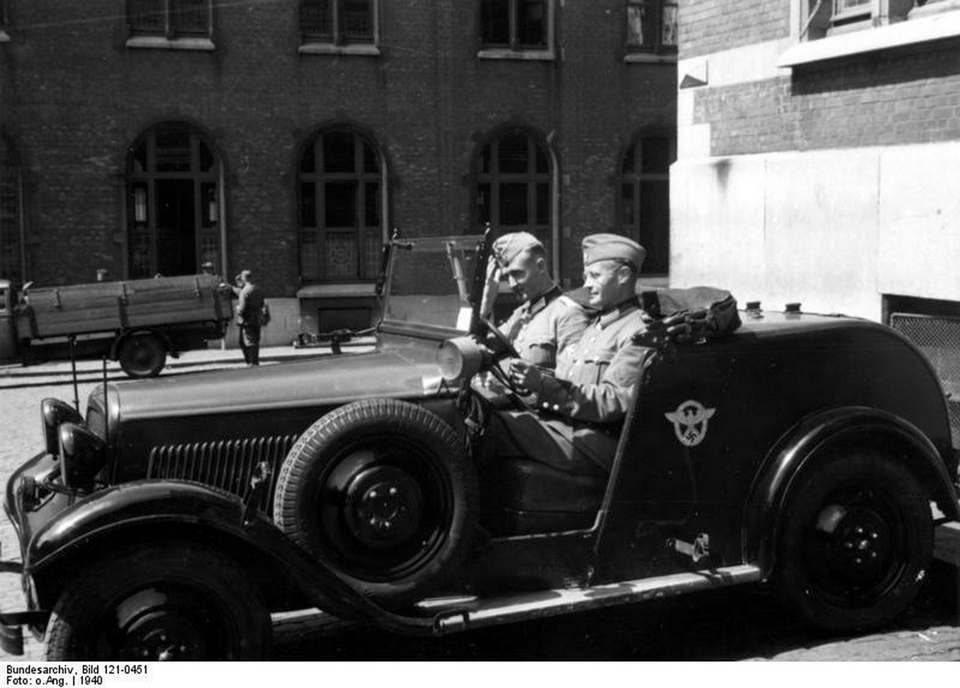
[Above: Two German police drive in style. Note the eagle and swastika with the wreath painted on the car. There were a gazillion different eagles in National Socialist Germany and each one often represented a specific organization or group. In the case of the German police there is always a wreath surrounding the eagle. Courtesy of the Bundesarchiv, 1941.]
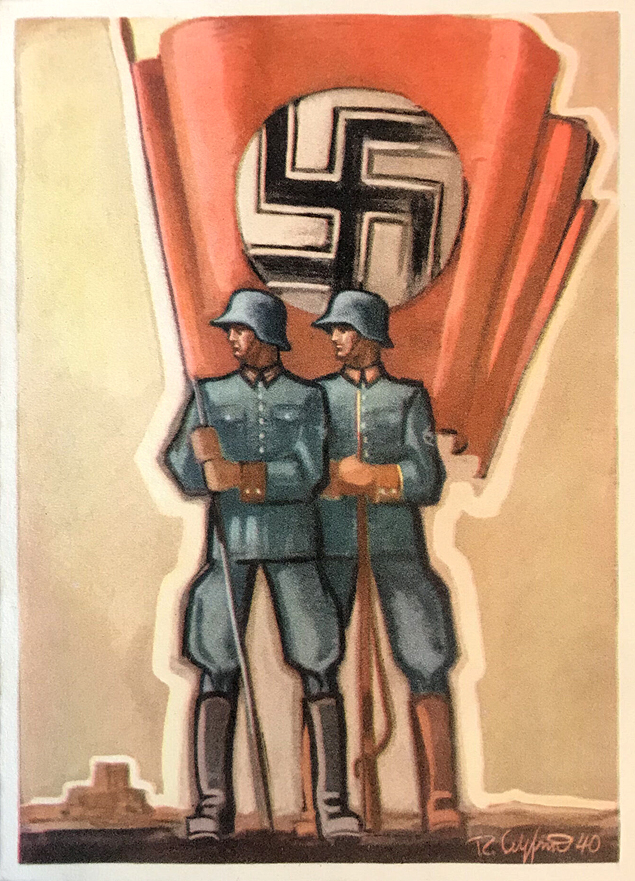
[Above: 1941 postcard for the 'Tag of deutschen polizei' (Day of German Police). Like the others above it honors the 'Ordnungspolizei (Order Police) und Sicherheitpolizei' (Security Police).]

[Above: Description on back of postcard.]
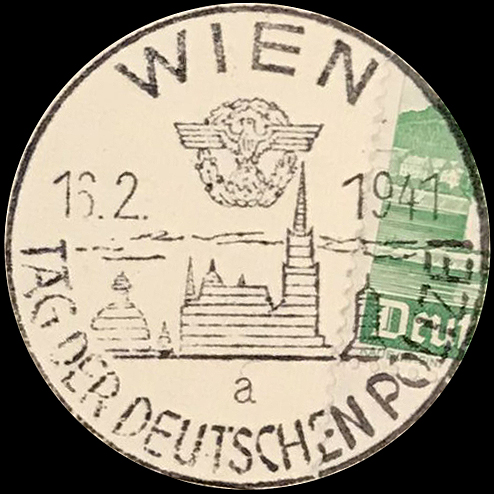
[Above: Special cancel on back of postcard.]
Back to Interviews













